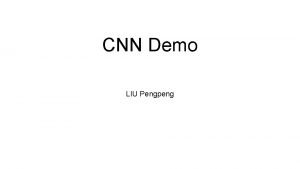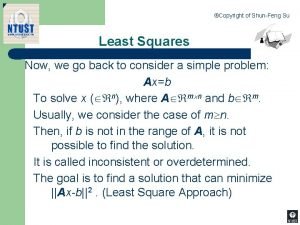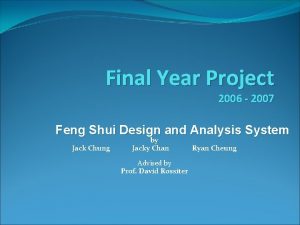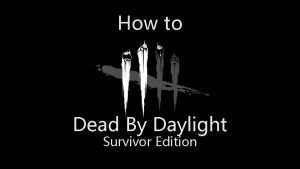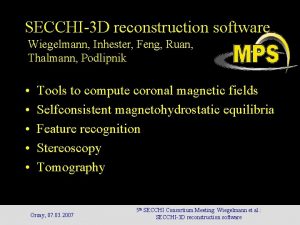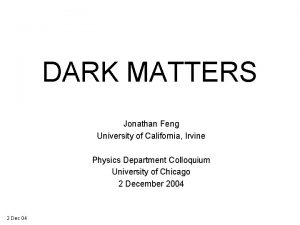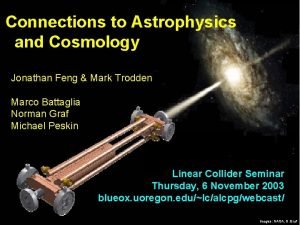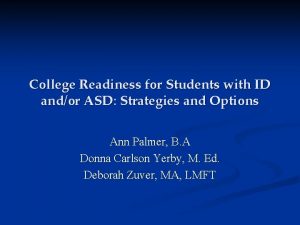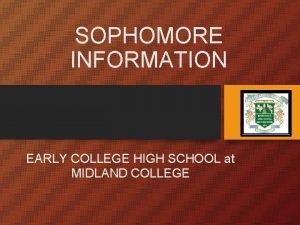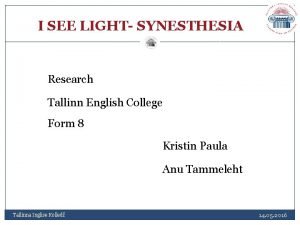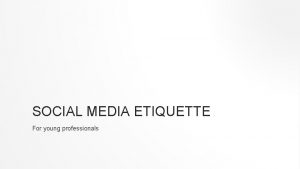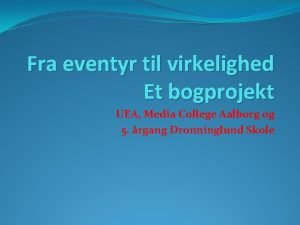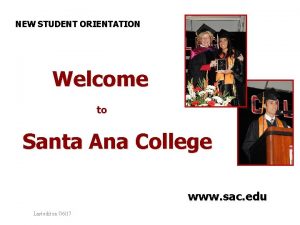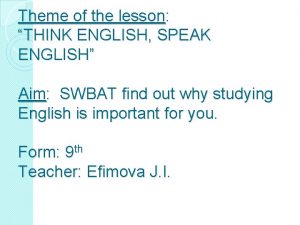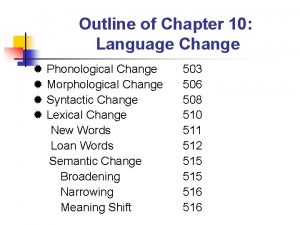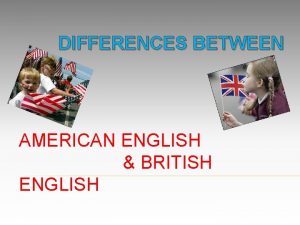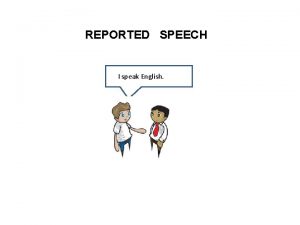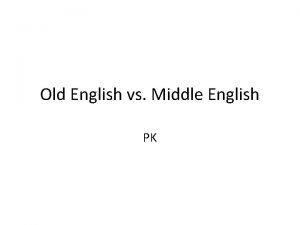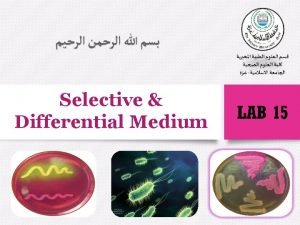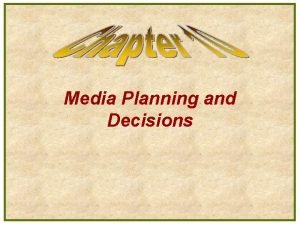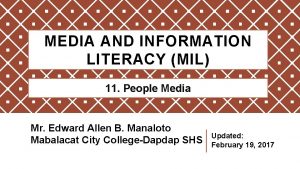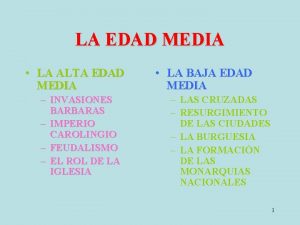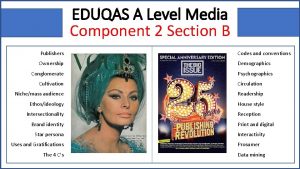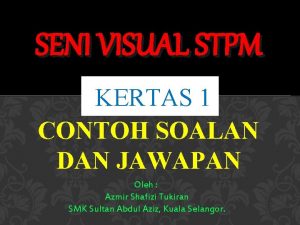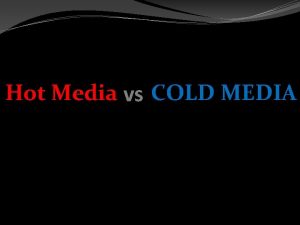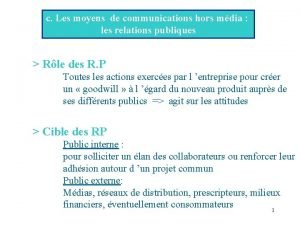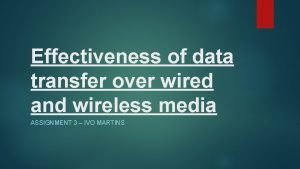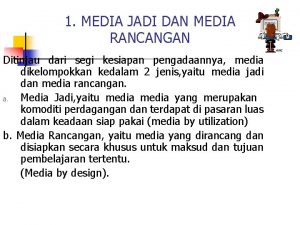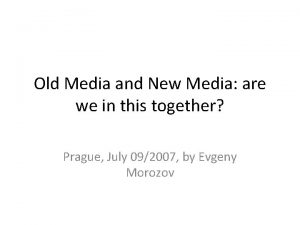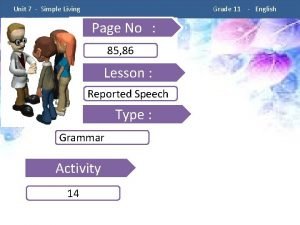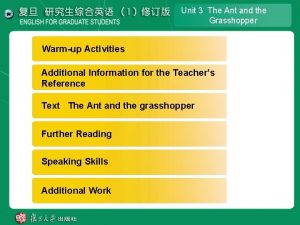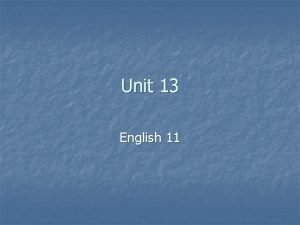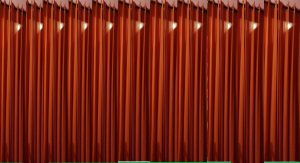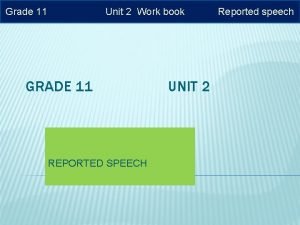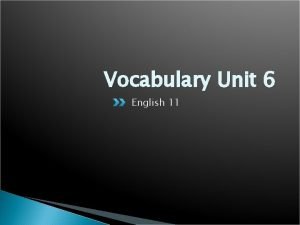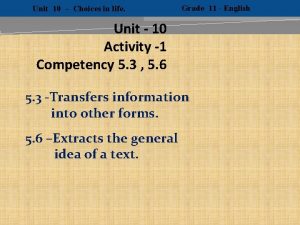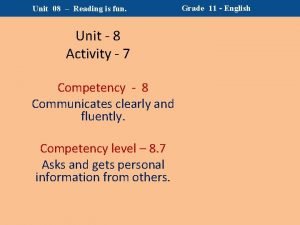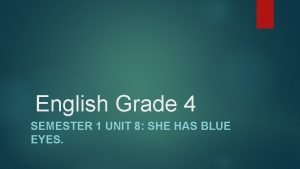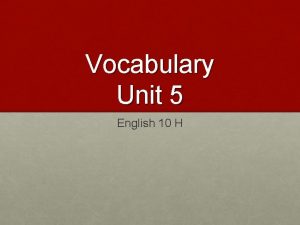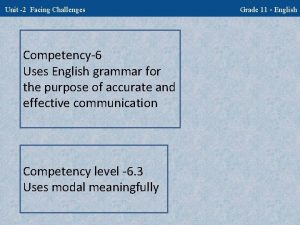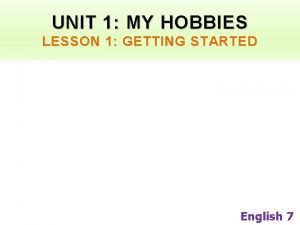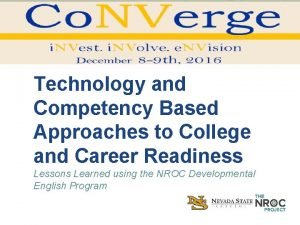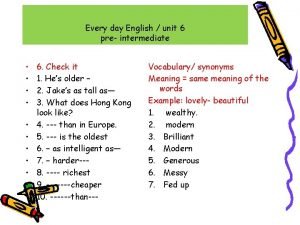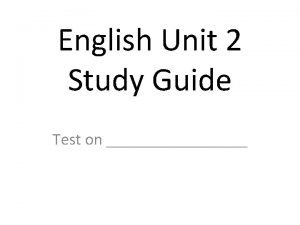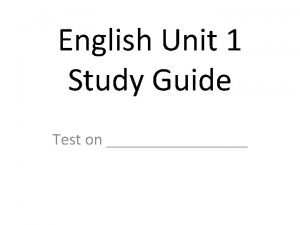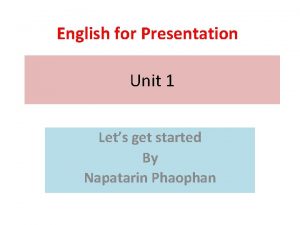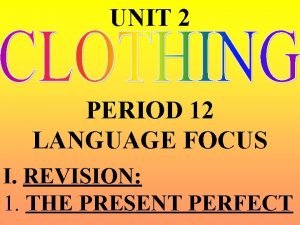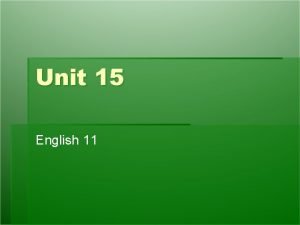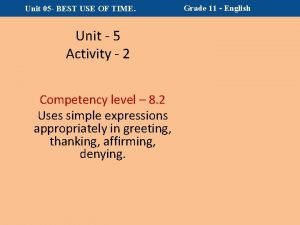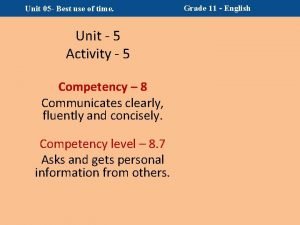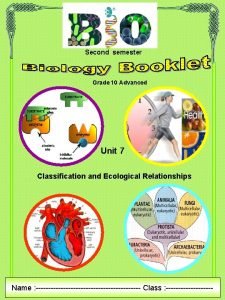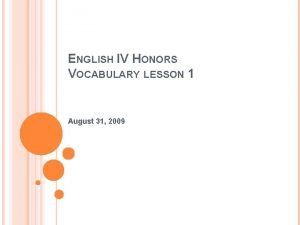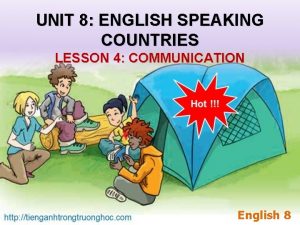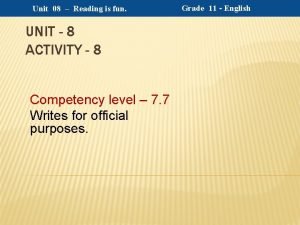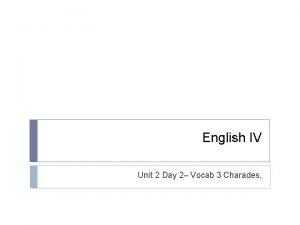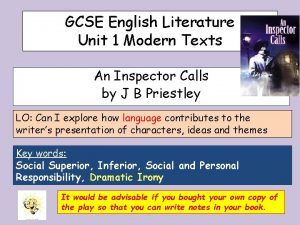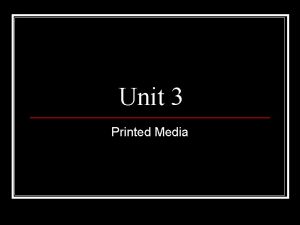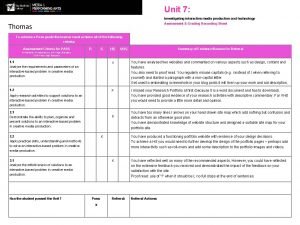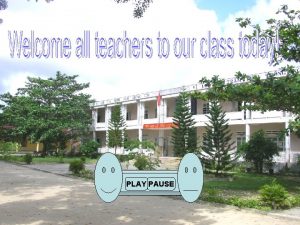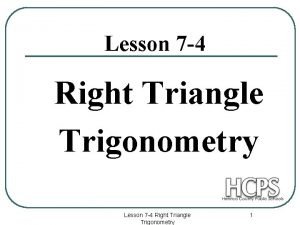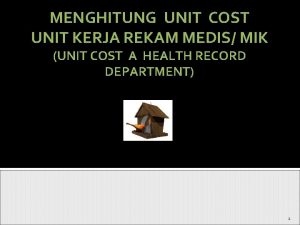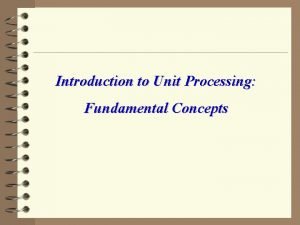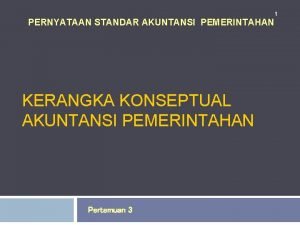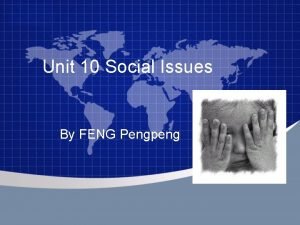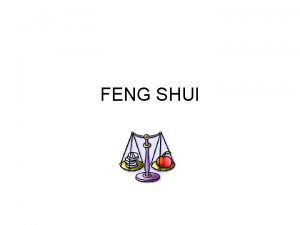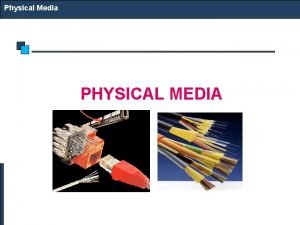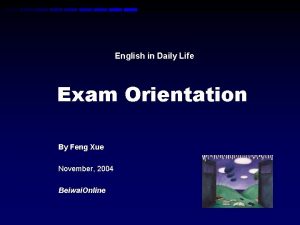College English 1 FENG Pengpeng Unit 8 Media



















































































































































- Slides: 147

College English 1 FENG Pengpeng

Unit 8 Media

Outline l Text A: Conversation l Nothing to Watch l Text B: Advertising l Exercises

Text A l Conversation: Nothing to Watch

Text A: An overview l It’s been a tough day for both Ann and Rita, and they’re trying to relax in front of the television. Unfortunately, deciding what to watch isn’t very simple.

l Rita: Would you please stop flipping through the channels like that? l Ann: I’m just trying to find something decent to watch. l Rita: Wouldn’t it be easier if you looked in the TV Guide instead of driving me nuts? l Ann: I’m sorry, I don’t mean to get on your nerves, but there’s absolutely nothing on. Those trashy news programs are on every channel!

l Ann: Oh, come on! All the news programs are the same. l Rita: No way! They are totally different. I admit some of them focus more on scandal than on real news. But Primetime Live does cover important stories. l Ann: Like what?

l Rita: Well, stories on political figures, government corruption, crime… l Ann: The problem is the news presenters have become more important than the news. l Rita: What do you mean? l Ann: The main goal of the networks is high rating. To gain this they make the journalists stars. Some anchors are so popular that people are willing to believe anything they say, whether accurate or not.

l Rita: But I don’t see anything wrong with it. After all, they make the news interesting and credible because of their charm. l Ann: Yeah, but that’s why it’s impossible to distinguish fact from fiction. In an era when technology has made it possible to experience events as they really happen, we are moving away from the news.

l Rita: We are moving away from the traditional ways of presenting news. Do you mind handing me the remote? I’ll find something we can watch. l Ann: OK. Here you are. I’m in the mood for something light and fun.

Detailed reading l It’s been a tough day for both Ann and Rita, and they’re trying to relax in front of the television. Unfortunately, deciding what to watch isn’t very simple.

¡tough 艰难的 e. g. ~ negotiation/ competition The company faces tough competition. 这家公 司面临着艰难的竞争。 ¡unfortunately 不幸地 Unfortunately, I missed the last train. 我不幸 错过了末班火车。 ¡deciding what to watch 动名词做主语

动名词作主语练习 l ____ is a good form of exercise for both young and old. A. The walk B. Walking B C. To walk D. Walk Note:不定式做主语常表示具体的某一动作; 表示泛指或 一般的抽象的概念时, 多用动名词。 l There is no use _____ over the split milk. C A. cry B. to cry C. crying D. cried l Note: 在”There/It +be+ no use (good/ help/ need)”之后 常用动名词做主语, 而少用不定式。但是如果出现for sb. 则用不定式,例句:There is no good for us to do that exercise.

翻译 l It’s been a tough day for both Ann and Rita, and they’re trying to relax in front of the television. Unfortunately, deciding what to watch isn’t very simple. l 安和丽塔度过了辛苦的一天,她们现在试图 看看电视放松放松。遗憾的是,决定看什 么并非易事。

l Rita: Would you please stop flipping through the channels like that? l Ann: I’m just trying to find something decent to watch. ¡ would you please… 表示请求或要求 ¡ stop doing sth. 停止做某事 比较:stop to do sth 停止手头的事情去做某事 ¡ flip through the channels 快速换频道 ¡ flip through 快速浏览,一扫而过 e. g. I haven't read the book properly, I just flipped through it to see what it was like. 我没有真正地看过这 本书,只是浏览了一下看是关于什么的罢了。

l I’m just trying to find something decent to watch. ¡ something decent 形容词修饰不定代词时放在不定代词 后面 e. g. l I didn’t do anything wrong. l I try to buy something decent to send to her as her birthday present. l 试题:I don’t like the decoration,could you B please show me ______? A. different something B. something different C. different everything D. everything different

l Rita: Would you please stop flipping through the channels like that? l Ann: I’m just trying to find something decent to watch. l 丽塔:你能不能不要那样换频道? l 安:我只是想找到值得一看的节目。

l Rita: Wouldn’t it be easier if you looked in the TV Guide instead of driving me nuts? l Ann: I’m sorry, I don’t mean to get on your nerves, but there’s absolutely nothing on. Those trashy news programs are on every channel!

Wouldn’t it be easier if you looked in the TV Guide instead of driving me nuts? l Wouldn’t it be easier if you did sth. 表示建议 l Instead of 而不是 e. g. He will go instead of you. 他去, 不是你去。 ¡比较:instead是副词,在句子中单独使用或用于句末; instead of后面必须与名词、代词、动名词等一起使用。 例句: l. He went to school by bike instead. Instead of going home, he went to the cinema. l drive sb nuts 使……烦,使……生气、难受 Long speech drives me nuts. 冗长的讲话使我难受。 Loud music drives me nuts. 吵闹的音乐使我难受。

l I’m sorry, I don’t mean to get on your nerves, but there’s absolutely nothing on. ¡Mean to do sth 故意做某事 e. g. I didn’t mean to hurt him. ¡get on sb’s nerves 使某人烦 ,与drive sb. nuts同义。e. g. You really get on my nerves.

l Rita: Wouldn’t it be easier if you looked in the TV Guide instead of driving me nuts? l Ann: I’m sorry, I don’t mean to get on your nerves, but there’s absolutely nothing on. Those trashy news programs are on every channel! l 丽塔: 你看看《电视指南》是否更容易?这么换 频道弄得我头都大了。 l 安: 抱歉,我无意烦你,但是确实没有什么可看 的,每个频道都是那些垃圾新闻节目。

l Rita: I think Primetime Live is on right now. That’s an informative program. l Ann: Oh, come on! All the news programs are the same.

l I think Primetime Live is on right now. ¡Primetime Live, now known as Primetime, is an award-winning news magazine program of ABC bringing in-depth investigative reports, crime and human interest stories. ¡prime time: the hours between 7 and 11 p. m. when the largest tv audience is available 黄金时段 ¡on 上演,播出

l That’s an informative program. l informative 信息丰富的 e. g. Well, this talk is most informative.


翻译 l Rita: I think Primetime Live is on right now. That’s an informative program. l Ann: Oh, come on! All the news programs are the same. l 丽塔:我想《黄金时段直播》现在正在播出, 这个节目信息很丰富。 l 安:噢,得了吧,所有的新闻节目都一样。

l Rita: No way! They are totally different. I admit some of them focus more on scandal than on real news. But Primetime Live does cover important stories. l Ann: Like what? l Rita: Well, stories on political figures, government corruption, crime… l Ann: The problem is the news presenters have become more important than the news. l Rita: What do you mean?

No way!. . . I admit some of them focus more on scandal than on real news. l No way! 不行,没门,决不,不是这回事 ¡A: Can you lend me 50 yuan? ¡B: No way! I lent 50 to you yesterday. l focus on 重点在于;集中在 ¡The discussion focused on the new project. l more A than B: 肯定A否定B, 如: ¡This book seems to be more a manual than a text. ¡Catherine is more diligent than intelligent.

But Primetime Live does cover important stories. l does 助动词在本句中表示强调 e. g. ¡I saw him yesterday. / I did see him yesterady. ¡You need a new car. / You do need a new car. l cover: 涉及,包含 ¡The news covers the murder yesterday. ¡This event will be covered live by TV. 此事将由 电视作现场报道。

l stories on political figures, government corruption, crime… ¡figure: n. 人物 e. g. Michael Jordan is an iconic figure. 乔丹是偶像 式的人物。 ¡corruption: n. 腐败 corrupt v. 腐败 corruptive adj. 腐败的 ¡crime: n. 罪行,犯罪

l news presenter: a person who presents a news show on television, radio or the Internet 新闻播音员 l Conversation:What do you mean? ¡ask for clarification (also known as newsreader, newscaster, anchorman or anchorwoman, news anchor or simply anchor)

l Rita: No way! They are totally different. I admit some of them focus more on scandal than on real news. But Primetime Live does cover important stories. l Ann: Like what? l Rita: Well, stories on political figures, government corruption, crime… l Ann: The problem is the news presenters have become more important than the news. l Rita: What do you mean? l 丽塔:才不是呢,完全不同。我承认,有些新闻节目更关注 丑闻而不是真正的新闻,但是《黄金时段直播》确实在关注 重要新闻。 l 安:比如说? l 丽塔:各种新闻报道,比如政治人物、政府腐败、犯罪等等。 l 安:问题是新闻播报员已经比新闻更重要了。 l 丽塔:你什么意思?

l Ann: The main goal of the networks is high rating. To gain this they make the journalists stars. Some anchors are so popular that people are willing to believe anything they say, whether accurate or not. l Rita: But I don’t see anything wrong with it. After all, they make the news interesting and credible because of their charm. l Ann: Yeah, but that’s why it’s impossible to distinguish fact from fiction. In an era when technology has made it possible to experience events as they really happen, we are moving away from the news.

The main goal of the networks is high rating. To gain this they make the journalists stars. l high rating 高收视率 ¡rating: evaluation or assessment ¡Ratings point is a measure of viewership of a particular television program. l to gain this 动词不定式做目的状语 l make the journalists stars ¡make sb. sth. 使某人成为…… e. g. They made me monitor. 他们让我当班长。

Some anchors are so popular that people are willing to believe anything they say, whether accurate or not. l anchor n. 新闻主播 l So…that…如此……以致 ¡ He’s so involved in reading that he did notice the ring on the door. l be willing to do sth. 乐意做某事 e. g. ¡ willing adj. 乐意的 ¡ He is always a willing helper. 他是一个乐于帮忙的人。 ¡ The spirit is willing but the flesh is weak. 心有余而力不 足。 ¡ I'd like to buy your house if you are willing to sell it. 如 果你愿意卖的话,我想买你的房子。

l whether accruate or not 无论是否准确 ¡whether … or not 是否 e. g. ¡I don‘t care whether he will come or not. 我不在乎他是否能来. ¡比较:whether or not 无论如何 e. g. Whether or not he will never be able to forgive me. 无论如何他都不能原谅我.

After all, they make the news interesting and credible because of their charm. l After all 毕竟 ¡ He did come after all! ¡ He is quite human after all. l make sth. + adj. 做宾语补足语 ¡ make me happy/ disappointed l credible: adj. 可信的 l because of+ sth 因为…… ¡ The train was delayed because of the bad weather. l charm: n. 魅力

… but that’s why it’s impossible to distinguish fact from fiction. l why引导表语从句 l distinguish fact from fiction ¡distinguish: v. 区分,表现突出 The twins were so much alike that it was impossible to distinguish one from the other. 这对孪生子像得使人无法分辨。 She distinguished herself by her coolness and bravery. 她因头脑冷静、敢作敢为而为人称道。 ¡fiction: n. 虚构

In an era when technology has made it possible to experience events as they really happen, we are moving away from the news. l In an era when… 此句中when引导定语从 句修饰表示时间的名词era ¡era: n. 时代 l experience events as they really happen 对事物的体验好似真实发生一般 l move away from 远离;变化 ¡More and more people are moving away from vegetarianism.

l Ann: The main goal of the networks is high rating. To gain this they make the journalists stars. Some anchors are so popular that people are willing to believe anything they say, whether accurate or not. l Rita: But I don’t see anything wrong with it. After all, they make the news interesting and credible because of their charm. l Ann: Yeah, but that’s why it’s impossible to distinguish fact from fiction. In an era when technology has made it possible to experience events as they really happen, we are moving away from the news. l 安:电视台的主要宗旨就是提高收视率,为此他们把新闻记者变 成了明星。有些主持人非常受欢迎,无论准确与否,人们愿意相 信他们所说的一切。 l 丽塔:可我不觉得这样有问题啊。不管怎样,因为他们的个人魅 力,他们让新闻有趣而且值得相信。 l 安:对,但是,我们因此可能区分不了事实和虚构了。现在,科 技已经让我们把任何事件体验得像真实经历一样;在这样的时代, 我们背离了新闻。

l Rita: We are moving away from the traditional ways of presenting news. Do you mind handing me the remote? I’ll find something we can watch. l Ann: OK. Here you are. I’m in the mood for something light and fun.

-- Do you mind handing me the remote? --OK, here you are. l conversation: Do you mind doing sth? 你介意…… 吗? ¡ Do you mind retiring earlier? ¡ Do you mind taking the bus? ¡ 回答时若表示不介意,用否定的句型。若的确介意,直接 说yes。真题举例: — Do you mind my smoking here? C — ______ A. No, thanks. B. Yes, I do. C. Yes. I'd rather not. D. Good idea. l hand:v. 递给 hand sb. sth. l remote: n. 遥控,即remote controller的简称。

I’m in the mood for something light and fun. l mood n. 心情,情绪 l in the mood for:乐意干某事 ¡She's in a good mood today. 她今天心情很好. ¡She‘s too tired and in no mood for dancing. 她 太累了,没有心情跳舞。 ¡I'm not in the mood to disagree with you. 我没 有心思跟你争论. ¡He's in no mood for (telling) jokes/to tell jokes. 他没心情说笑话

翻译 l Rita: We are moving away from the traditional ways of presenting news. Do you mind handing me the remote? I’ll find something we can watch. l Ann: OK. Here you are. I’m in the mood for something light and fun. l 丽塔:我们背离的是呈现新闻的传统方式。能否 让我拿一会儿遥控器?我来找一个我俩都能看的 节目。 l 安:好吧,给你。我想看点儿轻松搞笑的节目。

Idiomatic Study l Idiomatic study: Apologizing l To apologize: l I’m really/ very/ awfully sorry. l Please forgive me. l I (do) apologize. l Responding to an apology: l Don’t worry about it. l That’s OK/ all right. l No problem.

真题 l — I'm terribly sorry that I've spilled some coffee on the carpet. — _______. B A. Sorry. B. It doesn't matter. C. That's right. D. Don't mention it. l –Oh, sorry to bother you. A –_________. A. That’s Okay. B. No, you can’t. C. That’s good. D. Oh, I don’t know.


Unit 8 Text B: Advertising

Background information l Advertising is a form of communication intended to persuade its viewers, readers or listeners to take some action. l It usually includes the name of a product or service and how that product or service could benefit the consumer, to persuade potential customers to purchase or to consume that particular brand. l Modern advertising developed with the rise of mass production in the late 19 th and early 20 th centuries.

l Different types of media can be used to deliver these messages, including traditional media such as newspapers, magazines, television, radio, billboards or direct mail. l Virtually any medium can be used for advertising. l Celebrities: using celebrity power, fame, money, popularity to gain recognition for their products and promote specific stores or products.

l The use of celebrities to endorse a brand can have its downsides, however. One mistake by a celebrity can be detrimental to the public relations of a brand. l For example, following his performance of eight gold medals at the 2008 Olympic Games in Beijing, China, swimmer Michael Phelps' contract with Kellogg's was terminated, as Kellogg's did not want to associate with him after he was photographed smoking marijuana.

Main idea l Para 1: Advertisements are made by private mass media and they are almost everywhere. l Para 2: What are advertisements? l Para 3: There are five features of advertisements.

Detailed-reading: paragraph 1 l When you turn on the radio, you hear an advertisement. When you watch television, you hear and see an advertisement. If you turn the pages of a newspaper or magazine, again you find an advertisement. If you walk down the street, you see one advertising board after another. All day, every day, people who want to sell you something compete to catch your attention.

If you walk down the street, you see one advertising board after another. l advertising board 广告牌 l One after another: 一个接一个 e. g. ¡ Visitors came one after another. ¡ One visitor came after another. ¡ One after another they achieved independence.

All day, every day, people who want to sell you something compete to catch your attention. l people who want to sell you something 定 语从句 l Compete: v. to try to be more successful than someone or something else 竞争 e. g. ¡Both girls compete for their father’s attention. ¡It's difficult for a small supermarket to compete against/with the big supermarkets. l catch one’s attention 吸引某人注意

翻译 l When you turn on the radio, you hear an advertisement. When you watch television, you hear and see an advertisement. If you turn the pages of a newspaper or magazine, again you find an advertisement. If you walk down the street, you see one advertising board after another. All day, every day, people who want to sell you something compete to catch your attention. l 当你打开收音机,听到某则广告。当你看电视,听到看到 某广告。如果你翻开报纸或杂志的页面,你又发现广告。 如果你沿着街道走,你看到一个又一个的广告牌。一天到 晚,每一天,想要向你推销东西的人们争先恐后地吸引你 的注意

l As a result, advertisements are almost everywhere. In the West, advertisements are the fuel that makes mass media work. Many TV stations, newspapers, magazines, radio stations are privately owned. The government does not endorse them. So where does the money come from? From advertisements. Without advertisements, there would be no private businesses.

As a result, advertisements are almost everywhere. l As a result 结果 e. g. ¡ As a result, daily output has doubled. l advertisement: n. 广告 (a public promotion of some product or service) e. g. ¡ I suggest that he put an advertisement in the local paper. 我建议他在当地的报纸上登条广告。 ¡ 比较: advertising (the business of drawing public attention to goods and services) e. g. The advertising campaign didn't have much effect on sales. 这些广告攻 势对销售额并没有起到多大作用。

In the West, advertisements are the fuel that makes mass media work. l Fuel: n. a substance which is used to provide heat or power, usually by being burned 燃料,动 力 e. g. ¡ Wood, coal, oil, petrol and gas are all different kinds of fuel. ¡ The newspaper article provided him with fuel for his speech. 报纸上的这篇文章为他的演讲提供了启发。 l mass media: a section of the media specifically designed to reach a very large audience such as the population of a nation state. 大众传媒

Many TV stations, newspapers, magazines, radio stations are privately owned. l Privately: adv. by a person or company and not by the government 私人的 ¡privately owned 私有的 e. g. ¡ a privately-owned business 私营企业 ¡ a privately financed project 私人筹措资金项目

The government does not endorse them. l Endorse: v. to make a public statement of your approval or support for something or someone 支持、赞同、背书于 e. g. ¡ to endorse a political candidate. 支持政治候选 人 ¡ I am afraid I can't endorse your opinion. 很抱 歉,我不赞成你的意见。

Without advertisements, there would be no private businesses. l 从would be的用法可以看出本句是虚拟语气,其 中Without advertisements相当于If there were no advertisements ¡ 用“without/but for/in the absence of ”表示 “要不是”、“如 果没有”(相当于if it were not for…)表示条件时,句中 一般用虚拟语气 e. g. Without air, nothing could live. 要是没有空气,什么也 不能生存。 But for your assistance, we could not accomplish it. 要不 是你的帮忙,我们是难有成就的。 l private business 私营企业

翻译 l As a result, advertisements are almost everywhere. In the West, advertisements are the fuel that makes mass media work. Many TV stations, newspapers, magazines, radio stations are privately owned. The government does not endorse them. So where does the money come from? From advertisements. Without advertisements, there would be no private businesses. l 因此,广告几乎无所不在。在西方,广告是推动大众 传媒运作的燃料。许多电视台、报纸、杂志、电台都 是私人所有,政府不给他们经费。那么他们的经费从 何而来?来自于广告。如果没有广告,就不会有这些 私营企业。

Paragraph 2 l Have you ever asked yourself what advertising is? Through the years, people have given different answers to the question. For some time it was felt that advertising was a means of “keeping your name before the public”, and some people thought that advertising was “truth well told”.

Have you ever asked yourself what advertising is? l have ever asked 现在完成时 ¡ ever ad. 曾经, 永远, 究竟 e. g. I wondered if he'd ever stopped to think how I felt. 我不 知道他是否曾考虑过我的感受。 l 本句中 what 引导宾语从句 ¡ 宾语从句的连接代词主要有who, whom , whose , what, whoever , whomever , whosever, whatever, whichever等. e. g. ¡ Do you know who has won the game? 你知道谁赢了这 一局游戏吗? ¡ I don’t know whom you should depend on. 我不知道你该 依靠谁.

Through the years, people have given different answers to the question. l Through: from the beginning to the end of a period of time e. g. ¡It rained all/right through June and into the first half of July. ¡She had just enough energy to get through the day.

For some time it was felt that advertising was a means of “keeping your name before the public”, l for some time 有一段时间,一度 l it was felt that中it做形式主语,真正主语是 that从句 l a means of: a method or way of doing something ¡They had no means of communication. ¡The family had no means of support.

翻译 l Have you ever asked yourself what advertising is? Through the years, people have given different answers to the question. For some time it was felt that advertising was a means of “keeping your name before the public”, and some people thought that advertising was “truth well told”. l 你是否曾问过自己什么是广告?多年来,人们已 经对这一问题赋予了不同的答案。人们曾一度认 为广告是一种“让你的名字被公众关注”的手段, 有些人认为广告是“被恰如其分表露出的真相”。

l Now, more and more people perceive it in this way: advertising is the paid, nonpersonal, and usually persuasive presentation of goods, services and ideas by some certain sponsors through various media.

Now, more and more people perceive it in this way… l more and moer 越来越多 l Perceive: v. to come to an opinion about something, or have a belief about something 察觉, 感觉, 认知, 理解 e. g. ¡ I perceived a change in his behaviour/that his behaviour had changed. 我发觉他的行为有些 变化. ¡Women's magazines are often perceived to be superficial.

… advertising is the paid, non-personal, and usually persuasive presentation of goods, services and ideas by some certain sponsors through various media. l non-personal 非个人的 l persuasive: adj. making you want to do or believe a particular thing 劝说性的 e. g. ¡ a persuasive speaker/speech ¡ Your arguments are very persuasive. l Sponsor 赞助商 e. g. ¡All the major theatres now have sponsors, especially for high-cost productions.

翻译 l Now, more and more people perceive it in this way: advertising is the paid, non-personal, and usually persuasive presentation of goods, services and ideas by some certain sponsors through various media. l 现在,越来越多的人这样看待该问题:广告是某 些赞助商支付费用,通过不同的媒体对商品、服 务和观念的呈现,该呈现非个人化,而且通常是 劝说性的。

Paragraph 3 l First, advertising is usually paid for. Various sponsors pay for the advertisements we see, read, and hear over various media. Second, advertising is non-personal. It is not face-to-face communication. Although you may feel that a message in a certain advertisement is aimed directly at you, in reality, it is directed at large groups of people.

First, advertising is usually paid for. l pay for 付款,支付 e. g. ¡We will pay for houses by monthly instalments. 我们将按月分期付款买房。 ¡You get what you pay for. 一分钱一分货。 ¡They asked him to pay for the damage but he pleaded poverty. 他们要他付损害赔偿金, 但他 藉口贫穷而不偿还.

It is not face-to-face communication. l face-to-face: 面对面地 l E. g. They were standing quarreling face to face. l The two candidates will debate face to face. l

Although you may feel that a message in a certain advertisement is aimed directly at you, in reality, it is directed at large groups of people. l aim at/ direct at 瞄准,针对,以……为目标 e. g. ¡ The factory must aim at increasing production. ¡ We must aim at increasing/to increase exports. l in reality ad. 实际上(事实上) ¡ One‘s school life seems happier in retrospect than in reality. 人们的学校生活回想起来要比实际上的快乐。 ¡ It seems as if he knew everything, but in reality, he is as stupid as can be. 他似乎是个万事通。其实他是再愚蠢 不过了。

翻译 l First, advertising is usually paid for. Various sponsors pay for the advertisements we see, read, and hear over various media. Second, advertising is non-personal. It is not face-to-face communication. Although you may feel that a message in a certain advertisement is aimed directly at you, in reality, it is directed at large groups of people. l 首先,广告通常是付费的。各种各样的赞助商为我们在各 种媒体上看到、读到和听到的广告付费。第二,广告是非 个人化的,它不是面对面的交流。尽管你可能感到某个广 告中的一条信息是直接针对你而发的,事实上,其目标在 于大规模的人群。

l Third, advertising is usually persuasive. Directly or indirectly it asks people to do something. All advertisements try to make people believe that the product, idea, or service advertised can benefit them. Fourth, the sponsors of the advertisement must show their names. From the advertisement, we can see if the sponsor is a company, or an individual.

All advertisements try to make people believe that the product, idea, or service advertised can benefit them. l make sb do sth 使某人做某事(役使动词后省略 to的动词不定式) ¡ The teacher made the students read by themselves. l advertised此处为动词过去分词做定语,修饰前面 的product/ idea/ service,表示被动 l benefit: v. to be helped by something or to help someone e. g. ¡ I feel that I have benefited greatly from her wisdom. ¡ How can we benefit those who most need our help?

From the advertisement, we can see if the sponsor is a company, or an individual. l we can see if…此句中if引导宾语从句,表 示 “是否” l Individual: n. a single person or thing, especially when compared to the group or set to which they belong 个人 ¡Every individual has rights which must never be taken away. ¡ We’d better treat our students as individuals.

翻译 l Third, advertising is usually persuasive. Directly or indirectly it asks people to do something. All advertisements try to make people believe that the product, idea, or service advertised can benefit them. Fourth, the sponsors of the advertisement must show their names. From the advertisement, we can see if the sponsor is a company, or an individual. l 第三,广告通常是劝说性的。或直接或间接,广告要求人 们做一些事情。所有的广告都试图让人们相信广告宣传的 产品、观念或服务能够令人获益。第四,广告的赞助商必 须呈现他们的名字。从广告中我们能够看到其赞助商是一 个公司或是个人。

l Fifth, advertising reaches us through traditional and modem mass media. Included in the traditional media are newspapers, magazines, radio, television, and films. Modern media include emails, matchbox covers, and boards on top of buildings.

Included in the traditional media are newspapers, magazines, radio, television, and films. l 句型:倒装 l Newspapers, magazines, radiao, television, and films are included in the traditional media.

Modern media include emails, matchbox covers, and boards on top of buildings. l email 电子邮件 l Matchbox: a small box containing matches 火柴盒 l matchbox cover 火柴盒贴,火柴盒封面 l Board: n. a thin flat piece of cut wood or other hard material used for a particular purpose 广告牌 l E. g. There was a 'For Sale' board outside the house.

翻译 l Fifth, advertising reaches us through traditional and modem mass media. Included in the traditional media are newspapers, magazines, radio, television, and films. Modern media include emails, matchbox covers, and boards on top of buildings. l 第五,广告通过传统和现代的大众传媒影响我们。 传统媒体包括报纸、杂志、电台、电视和电影;现 代媒体包括电子邮件、火柴盒封面和高楼顶端的广 告牌。

Unit 8 Text B: Advertising Comprehension Questions:

l 1. The existence of the privately owned mass media depends on the support of_____. A. the government B. their owners’ families C. advertisers D. the TV stations P 1: Many TV stations, newspapers, magazines, radio stations are privately owned. The government does not endorse them. So where does the money come from? From advertisements. Without advertisements, there would be no private businesses.

2. According to the passage, different definitions of advertising are given due to _______. A. the change of time B. the subject of the advertisements C. people’ age difference D. different ways of making advertisements P 2: Through the years, people have given different answers to the question. For some time it was felt that advertising was a means of “keeping your name before the public”… Now, more and more people perceive it in this way: ….

l 3. Which of the following is true about people’s understanding of advertising now? A. The purpose of advertising is to make people known by the public. B. Advertising should be targeted at certain individuals. C. The purpose of advertising is to make people believe in something. D. Advertising should tell true stories in an attractive way. P 3: All advertisements try to make people believe that the product, idea, or service advertised can benefit them. Second, advertising is non-personal…. it is directed at large groups of people.

l 4. We know from the context “sponsor” means ________. A. the one who launches a certain program B. the one who pays for media in return for advertising C. the one who assumes responsibility for advertising D. the one who support a candidate P 3: First, advertising is usually paid for. Various sponsors pay for the advertisements we see, read, and hear over various media.

l 5. The last paragraph is mainly about __________. A. various types of media for advertising B. features of advertising C. advertising and communication D. targets of advertising


I. Conversation 1. — Would you mind changing seats with me? — __________. A. Yes, you can. B. Of course, I like to. C. No, I don’t mind. D. Certainly, please do.

l 2. — I’m sorry. I lost the key. l — _______. l A. Well, it’s OK. l B. No, it’s all right. l C. You are welcome. l D. You are wrong.

l 3. — It’s rather cold here. Do you mind if I close the window? l — _________. l A. Yes, please. B. No, go ahead. l C. Sure, please. D. I don’t like it.

4. — Do you mind my smoking here? — __________. A. No, thanks. B. Yes, I do. C. Yes. Why not? D. Good idea.

5. — Could you be so kind as to turn down the music? I’m preparing for tomorrow’s exam. — _________. A. It’s none of your business. B. What are you doing? C. Sure. Sorry to disturb you. D. No, I don’t think so.

Part 2: Reading Comprehension

l The mass media influences all aspects of our lives, including the learning of gender roles. Newspapers and magazines, television, and film all have an influence on how we view the roles of women and on how we think they should behave.

l Four decades ago, traditional women’s magazines such as Good Housekeeping and Family Circle talked to women as though they were children who needed to learn the basics of how to care for their families. Today, magazines do not do this.

l However, they still tend to define the female role in terms of homemaking and motherhood, and to offer beauty advice to help women attract men and please husbands. There are now a few less traditional magazines such as Ms. that show women in a range of roles and that cover a much wider range of topics.

l Television commercials have also, until recently, presented women primarily as sex objects and as housewives. Young sexy women were shown admiring older men who smoked a particular cigarette brand. Housewives were shown smiling joyfully about their clean bathrooms, or looking guilty for not using the right laundry soap to wash their husband’s clothes.

l These days advertisers are more careful about the way they present women, and they are presented in a variety of roles. However, it is still quite common to see advertisements where beautiful young women are dressed in sexy clothes to sell cars or other products. One study also found that the changes are mainly on nighttime television, with daytime commercials still tending to portray women doing household chores.

l Prime-time television programs also often used to stereotype women. In past decades, women were usually portrayed as lovers, as mothers, or as weak, passive girlfriends of powerful, effective men. Today’s TV programs are somewhat different.

l Women are more likely to be presented as successful and able to support themselves and their families, but the traditional stereotypes of women are still there. Even when women are depicted as career women, the storylines suggest that they should be sexy as well.

1. The best title for this passage is _________. A. Gender Roles in the Media B. Influence of Mass Media in Our Lives C. Different Types of Media D. Women’s Magazines and Televisions

2. What makes Ms. different from other women’s magazines? A. Ms. offers women tips of caring for their families. B. Ms. treats women as adults who need to learn about being a mother. C. Ms. is interested in a wider range of women’s role. D. Ms. is the type of women’s magazines that dominates now. P 2: There are now a few less traditional magazines such as Ms. that show women in a range of roles and that cover a much wider range of topics.

3. It can be inferred that ______ might be a new type of women image on the television commercials. A. young beautiful women dressed in sexy clothes B. happy mothers doing the household chores C. guilty wives who don’t use the right soap D. career women who enjoys her career success P 3: it is still quite common to see advertisements where beautiful young women are dressed in sexy clothes to sell cars or other products. Housewives were shown smiling joyfully about their clean bathrooms, or looking guilty for not using the right laundry soap to wash their husband’s clothes.

4. From the context we know “to stereotype women” (Line 1, Paragraph 4) refers to _______. A. to tag on women some fixed roles and images B. to portray women in some different ways C. to depict women as successful and able to support themselves D. to portray women as successful professionals P 4: Prime-time television programs also often used to stereotype women.

5. Which of the following statement do you think the writer would least agree with in terms of the media’s attitude towards women? A. The mass media always presents to us a variety of women images as they are in daily life. B. The mass media focuses women’s roles in life as a mother more than as a professional. C. The way mass media define women has changed as time goes by. D. The limited images of women mass media presented to the audience have influenced the way the audience think and behave.

III. Vocabulary and Structure 1. The company is going through a ____ time at the moment. A. rough B. tight C. tough D. strong

2. Do you think there’s such a thing as _____ truth? A. absolute B. extreme C. perfect D. pure

3. We hope to be more ____ in predicting earthquake. A. clear B. factual C. capable D. accurate

4. I sometimes have difficulty ______ French from Italian. A. to distinguish B. being distinguished C. distinguishing D. distinguish

5. Leave me alone. I’m _____ no mood for chatting. A. in B. on C. at D. with

6. They created one new record _____ another. . A. with B. behind C. on D. after

7. — When shall we meet? — _____ it any day you like. It’s all the same to me. A. Do B. Get C. Meet D. Make

8. Although he did not know London well, he made his way ____ to the airport. A. easy enough B. enough easy C. easily enough D. enough easily

9. It’s said that _____ boys in your school like playing football in their spare time, though others prefer basketball. A. quite a lot B. quite a few C. quite a bit D. quite a little

10. While I was at the university, I learned to take photos, _______ is now very useful for me. A. it B. which C. that D. what

l College English l Unit 8 l Exercises l IV. Cloze

l Think about television, radio, newspapers, the Internet — even T-shirts. We are exposed to __1__ media-generated messages in one day than our great grandparents were in a year. l __2__ from the media is built just as buildings and highways are __3__ : a plan is made, the building blocks are gathered and people get paid to do different jobs.

l __4__ we are watching the news on TV, passing a billboard on the street or reading a pop music magazine, the media messages we experience were written by someone (or probably many people). Images were taken and edited, and a team with many talents put it all together.

l During the process, __5__ are made. If some words are added, others are edited out; if one picture is __6__ , dozens may have been rejected; if an ending to a story is written one way, other endings may not have been explored. l As the audience, we don’t get to see or hear the words, pictures or endings that were rejected. We only see, hear or read what was __7__. Nor does anybody ever explain why certain choices were made.

l The result is that whatever is "made" by just a few people becomes " normal " for the __8__ of us. Like the air we breathe, the media is taken for granted and their messages can go unquestioned. l The __9__ of media messages depends on how natural they are. We turn off a TV show that looks unnatural. But the truth is, it's all __10__ by people.

l Think about television, radio, newspapers, the Internet — even T-shirts. We are exposed to __1__ media-generated messages in one day than our great grandparents were in a year. l __2__ from the media is built just as buildings and highways are __3__ : a plan is made, the building blocks are gathered and people get paid to do different jobs. l 1. A. enough B. more C. interesting D. boring l 2. A. Information B. Influence C. Word D. Resource l 3. A. put together B. taking shape C. made up D. worked out

l __4__ we are watching the news on TV, passing a billboard on the street or reading a pop music magazine, the media messages we experience were written by someone (or probably many people). Images were taken and edited, and a team with many talents put it all together. l 4. A. Whether B. If C. When D. Unless

l During the process, __5__ are made. If some words are added, others are edited out; if one picture is __6__ , dozens may have been rejected; if an ending to a story is written one way, other endings may not have been explored. l 5. A. plans B. stories C. choices l 6. A. taken B. enlarged C. painted D. products D. selected

l As the audience, we don’t get to see or hear the words, pictures or endings that were rejected. We only see, hear or read what was __7__. Nor does anybody ever explain why certain choices were made. l 7. A. decided B. said C. done D. known

l The result is that whatever is "made" by just a few people becomes " normal " for the __8__ of us. Like the air we breathe, the media is taken for granted and their messages can go unquestioned. l 8. A. other B. rest C. all D. lots

l The __9__ of media messages depends on how natural they are. We turn off a TV show that looks unnatural. But the truth is, it's all __10__ by people. l 9. A. understanding B. success C. effect D. work l 10. A. made up B. worked up C. put up D. set up

V. Translation:Put the following sentences into Chinese. l 1. All day, every day, people who want to sell you something compete to catch your attention. 一天到晚,每一天,想要向你推销东西的 人们争先恐后地吸引你的注意力。

l 2. In the West, advertisements are the fuel that makes mass media work. 在西方,广告是推动大众传媒运作的燃料。

l 3. Through the years, people have given different answers to the question. 多年来,人们已经对这一问题赋予了不同的答案。

l 4. Although you may feel that a message in a certain advertisement is aimed directly at you, in reality, it is directed at large groups of people. 尽管你可能感到某个广告中的一条信息是直接 针对你而发的,事实上,其目标在于大规模 的人群。

l 5. From the advertisement, we can see if the sponsor is a company, or an individual. 从广告中我们能够看到其赞助商是一个公司或 是个人。

VI. Writing l You are required to write a composition on the topic “Media and Shopping” with no less than 80 words based on the outline given below. l 1. 通过媒体购物逐渐成为一种普遍现象; l 2. 媒体购物给人们带来很多方便,同时也 暴露出其弊端; l 3. 我的看法。

Sample l Nowadays, an increasing number of people are fond of purchasing goods with the help of media, such as newspapers, radio stations, TV stations and the Internet. l

l On the one hand, shopping via media saves time, money and effort, since we do not have to go to the shops in person. On the other hand, there is the risk of being cheated by the false information and thus we may suffer a considerable loss. l

l As far as I am concerned, we need strengthened supervision over the information released via media. In this way, we can reap the benefits while reducing the possible harm.

Additional Information: Mass Media l Mass media denotes a section of the media specifically designed to reach a very large audience such as the population of a nation state. l The term public media has a similar meaning: it is the sum of the public mass distributors of news and entertainment across media such as newspapers, television, radio, broadcasting.

l Mass media includes Internet media (like blogs, message boards, and video sharing) because individuals now have a means to exposure that is comparable in scale to that previously restricted to a select group of mass media producers.

Mass media can be used for various purposes: l Advocacy, both for business and social concerns. This can include advertising, marketing, propaganda, public relations, and political communication. l Entertainment, traditionally through performances of acting, music, and sports, along with light reading; since the late 20 th century also through video and computer games. l Public service announcements.

Electronic media and print media include: l Broadcasting, in the narrow sense, for radio and television. l Various types of discs or tapes. In the 20 th century, these were mainly used for music. Video and computer uses followed. l Film, most often used for entertainment, but also for documentaries. l Internet, which has many uses and presents both opportunities and challenges. Blogs and podcasts (such as news, music, pre-recorded speech, and video)

Non-mass or "personal" media l point-to-point and person-to-person communication l include: ¡Gestures ¡Interactive ¡Internet ¡Mail ¡Speech

l Mobile phones, often called the 7 th Mass Media, used for rapid breaking news, short clips of entertainment like jokes, horoscopes, alerts, games, music, and advertising l Publishing, including electronic publishing l Video games, which have developed into a mass form of media since cutting-edge devices broadened their use.

 Liu pengpeng
Liu pengpeng Feng doolittle algorithm
Feng doolittle algorithm Feng doolittle algorithm
Feng doolittle algorithm Feng guo symmetry
Feng guo symmetry Victor van der veen
Victor van der veen Joseph yu
Joseph yu Shun-feng su
Shun-feng su Feng's classification in computer architecture
Feng's classification in computer architecture Feng yuan microsoft
Feng yuan microsoft Feng shui
Feng shui Wayne feng
Wayne feng Feng shui floor plan analysis
Feng shui floor plan analysis Fung joe guey
Fung joe guey Iridescent shards dead by daylight
Iridescent shards dead by daylight Feng suave vpro
Feng suave vpro Dr connie feng
Dr connie feng Benefits of feng shui
Benefits of feng shui Pupuk feng shou untuk singkong
Pupuk feng shou untuk singkong Zuo-feng zhang
Zuo-feng zhang Jonathan feng white & case
Jonathan feng white & case Itanium benchmark
Itanium benchmark Feng lu
Feng lu Feng doolittle algorithm
Feng doolittle algorithm Feng ruan
Feng ruan Jonathan feng
Jonathan feng Jonathan feng white & case
Jonathan feng white & case English unit conversions
English unit conversions Unit 10, unit 10 review tests, unit 10 general test
Unit 10, unit 10 review tests, unit 10 general test Wake tech admissions
Wake tech admissions Early college high school at midland college
Early college high school at midland college Cet band 4
Cet band 4 Mid term test english 10
Mid term test english 10 College english notes
College english notes New horizon college english
New horizon college english Tallinn english college
Tallinn english college New horizon english book 4
New horizon english book 4 Social media etiquette for college students
Social media etiquette for college students Magister mediacollege
Magister mediacollege Media college aalborg
Media college aalborg Santa ana college math center
Santa ana college math center English speak lesson
English speak lesson Spoken english and broken english
Spoken english and broken english Phonological change examples
Phonological change examples Who is the father of english drama
Who is the father of english drama Old english vs modern english
Old english vs modern english British and american word differences
British and american word differences American and british english
American and british english Old english vs modern english
Old english vs modern english Bella said i speak english
Bella said i speak english Thy thou thee old english
Thy thou thee old english The gap between written and spoken english
The gap between written and spoken english Difference between american english and british english
Difference between american english and british english Selective media
Selective media Perbedaan alat permainan edukatif dan media pembelajaran
Perbedaan alat permainan edukatif dan media pembelajaran Decision media
Decision media What is meant by the term people in media
What is meant by the term people in media Invasiones en la alta edad media
Invasiones en la alta edad media Caracteristicas de la baja edad media
Caracteristicas de la baja edad media Difference between hot media and cold media
Difference between hot media and cold media Staphylococcus aureus on emb agar
Staphylococcus aureus on emb agar A level media vogue media language
A level media vogue media language Contoh soalan dan jawapan esei seni visual stpm penggal 1
Contoh soalan dan jawapan esei seni visual stpm penggal 1 Hot media and cold media
Hot media and cold media Communication hors média avantages inconvénients
Communication hors média avantages inconvénients Wired and wireless media
Wired and wireless media Media jadi dan media rancangan
Media jadi dan media rancangan Luhan hot
Luhan hot New media vs old media
New media vs old media Wjec gce english language and literature
Wjec gce english language and literature Grade 11 english unit 3
Grade 11 english unit 3 Grade 11 english pupils book answers
Grade 11 english pupils book answers What is the main idea of the ant and the grasshopper
What is the main idea of the ant and the grasshopper Unit 13 english 11
Unit 13 english 11 Grade 11 english poem in myanmar
Grade 11 english poem in myanmar เฉลย my english lab unit 2
เฉลย my english lab unit 2 The olympic games class 4 question answer
The olympic games class 4 question answer Grade 11 unit 2
Grade 11 unit 2 Unit 15 class 11 english grammar
Unit 15 class 11 english grammar Unit 9 english in the world looking back
Unit 9 english in the world looking back Class 4 english unit 14
Class 4 english unit 14 English 11 unit 6
English 11 unit 6 English 10 unit 5 vocabulary
English 10 unit 5 vocabulary Unit 10 english class 11
Unit 10 english class 11 Grade 8 english unit 8
Grade 8 english unit 8 English 3 unit 5
English 3 unit 5 Grade 4 english unit 8
Grade 4 english unit 8 Unit 7 english 8
Unit 7 english 8 English 8 unit 1
English 8 unit 1 English 10 unit 5 vocabulary
English 10 unit 5 vocabulary Notice grade 11
Notice grade 11 Grade 11 english pupils book unit 7 answers
Grade 11 english pupils book unit 7 answers Grade 11 unit 2
Grade 11 unit 2 Unit 1 hobbies
Unit 1 hobbies Edready nsc
Edready nsc English unit 6
English unit 6 Unit 2 test study guide
Unit 2 test study guide English unit 1 test
English unit 1 test Let's start with introduction
Let's start with introduction Unit 3 getting started
Unit 3 getting started Misology in a sentence
Misology in a sentence English 7 unit 3
English 7 unit 3 English 2 honors vocabulary unit 1
English 2 honors vocabulary unit 1 Not genuine, not true, not valid
Not genuine, not true, not valid English 10 vocabulary unit 1
English 10 vocabulary unit 1 Unit 7 grade 11
Unit 7 grade 11 Unit 2 lớp 12 language focus
Unit 2 lớp 12 language focus English 11 unit 15
English 11 unit 15 Grade 11 goals
Grade 11 goals Grade 11 unit 5
Grade 11 unit 5 Grade 11 english unit 5
Grade 11 english unit 5 Std 6 english unit 2
Std 6 english unit 2 Grade 10 biology unit 3
Grade 10 biology unit 3 English 4 vocabulary unit 1
English 4 vocabulary unit 1 Linggur
Linggur Unit 8 english speaking countries
Unit 8 english speaking countries Grade 11 english unit 8
Grade 11 english unit 8 English iv unit 9
English iv unit 9 Topic traveling around viet nam
Topic traveling around viet nam English 8 unit 10
English 8 unit 10 English 6 unit 9
English 6 unit 9 English unit 10
English unit 10 English module grade 10 unit 3
English module grade 10 unit 3 English literature unit 1
English literature unit 1 Unit 1: media representations mark scheme
Unit 1: media representations mark scheme Unit 3 the news and media
Unit 3 the news and media Eng2d media unit
Eng2d media unit Interactive media unit
Interactive media unit Unit 5 the media
Unit 5 the media Suatu lembaga yang
Suatu lembaga yang Hyp opp adj
Hyp opp adj Unit test unit test review algebra 2
Unit test unit test review algebra 2 Contoh unit cost rekam medis
Contoh unit cost rekam medis Unit process and unit operation
Unit process and unit operation What is unit operation and unit process
What is unit operation and unit process Kerangka konseptual standar akuntansi pemerintahan
Kerangka konseptual standar akuntansi pemerintahan Zeal dnyanganga college of engineering and research
Zeal dnyanganga college of engineering and research Reggio curriculum
Reggio curriculum Woodland community college counseling
Woodland community college counseling Dr rick griffith
Dr rick griffith Solihull sixth form tyber
Solihull sixth form tyber Tams ut austin
Tams ut austin College lexile level
College lexile level T-stem early college high school
T-stem early college high school Chaffeyview
Chaffeyview St wilfrid's rc college south shields
St wilfrid's rc college south shields Kensington international college
Kensington international college Moodle greenhead
Moodle greenhead Grantham college vle
Grantham college vle
